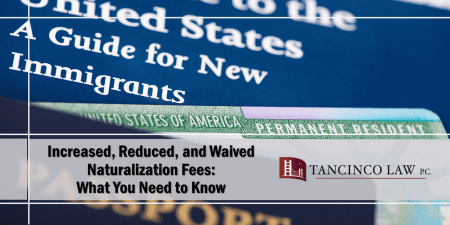Effective April 1, 2024, U.S. Citizenship and Immigration Services (USCIS) implemented new filing fees for naturalization applications. The standard fee for paper filings has risen to $760, while online filings now cost $710. Alongside these changes, USCIS has updated the criteria for reduced fees and fee waivers, potentially expanding access to naturalization for eligible applicants.
New Fee Structure and Reduced Fees
The 2024 fee rule introduces a significant change: applicants now have the opportunity to pay a reduced naturalization fee, which is 50% of the standard fee, amounting to $380. This reduction aims to make the naturalization process more accessible to a broader range of individuals who meet specific eligibility criteria.
Full Fee Waiver: Eligibility Criteria
For those facing financial difficulties, a complete waiver of the filing fee is available. To qualify for this 100% fee waiver, applicants must meet one of the following criteria:
- Receipt of Means-Tested Benefits: Applicants who receive federal, state, local, or tribal benefits that are determined based on income and resources may qualify for a full fee waiver. These means-tested benefits consider an individual’s financial situation in determining eligibility.
- Income Below 150% of Federal Poverty Guidelines: Applicants whose income is at or below 150% of the federal poverty guidelines can also qualify for a full fee waiver. The poverty guidelines vary based on household size, and specific income thresholds must be met to qualify.
- Extreme Financial Hardship: USCIS defines extreme financial hardship as a situation where applicants need almost all of their current income and liquid assets to meet ordinary and necessary living expenses. Examples of such hardship include:
- Medical illness
- Unemployment
- Eviction or homelessness
- Natural disasters
- Military deployment of a spouse or parent
- Divorce or death of a spouse
- Other unexpected life events that limit the ability to cover living expenses
Additionally, fee exemptions have been expanded to include applicants and their derivatives seeking relief under the Violence Against Women Act (VAWA), U Nonimmigrant status, T Nonimmigrant status, and Special Immigrant Juvenile Status (SIJ).
2024 Federal Poverty Guidelines
To understand eligibility for fee waivers and reductions, it’s essential to refer to the 2024 federal poverty guidelines:
| # of Persons in Household | Poverty Guidelines | 0-149% (Fee Waiver) | 150-400% (Reduced Fee) |
| 1 | $15,060 | $22,439.40 | $60,240 |
| 2 | $20,440 | $30,455.60 | $81,760 |
| 3 | $25,820 | $38,471.80 | $103,280 |
| 4 | $31,200 | $46,488.00 | $124,800 |
| 5 | $36,580 | $54,504.20 | $146,320 |
| 6 | $41,960 | $62,520.40 | $167,840 |
| 7 | $47,340 | $70,536.60 | $189,360 |
| 8 | $52,720 | $78,552.8 | $210,880 |
For households with more than eight persons, add $5,380 for each additional person to the base poverty guideline before applying the respective calculations.
Conclusion
Understanding the new fee structure and eligibility criteria for reduced fees and fee waivers is crucial for non-U.S. citizens seeking naturalization. These changes by USCIS aim to balance the cost of processing applications with the need to ensure accessibility for all eligible individuals. If you believe you qualify for a reduced fee or a fee waiver, consider consulting with an immigration attorney to navigate the application process effectively.
For further assistance or to discuss your specific situation, please contact our law firm. We are here to help you understand your options and guide you through the naturalization process.


